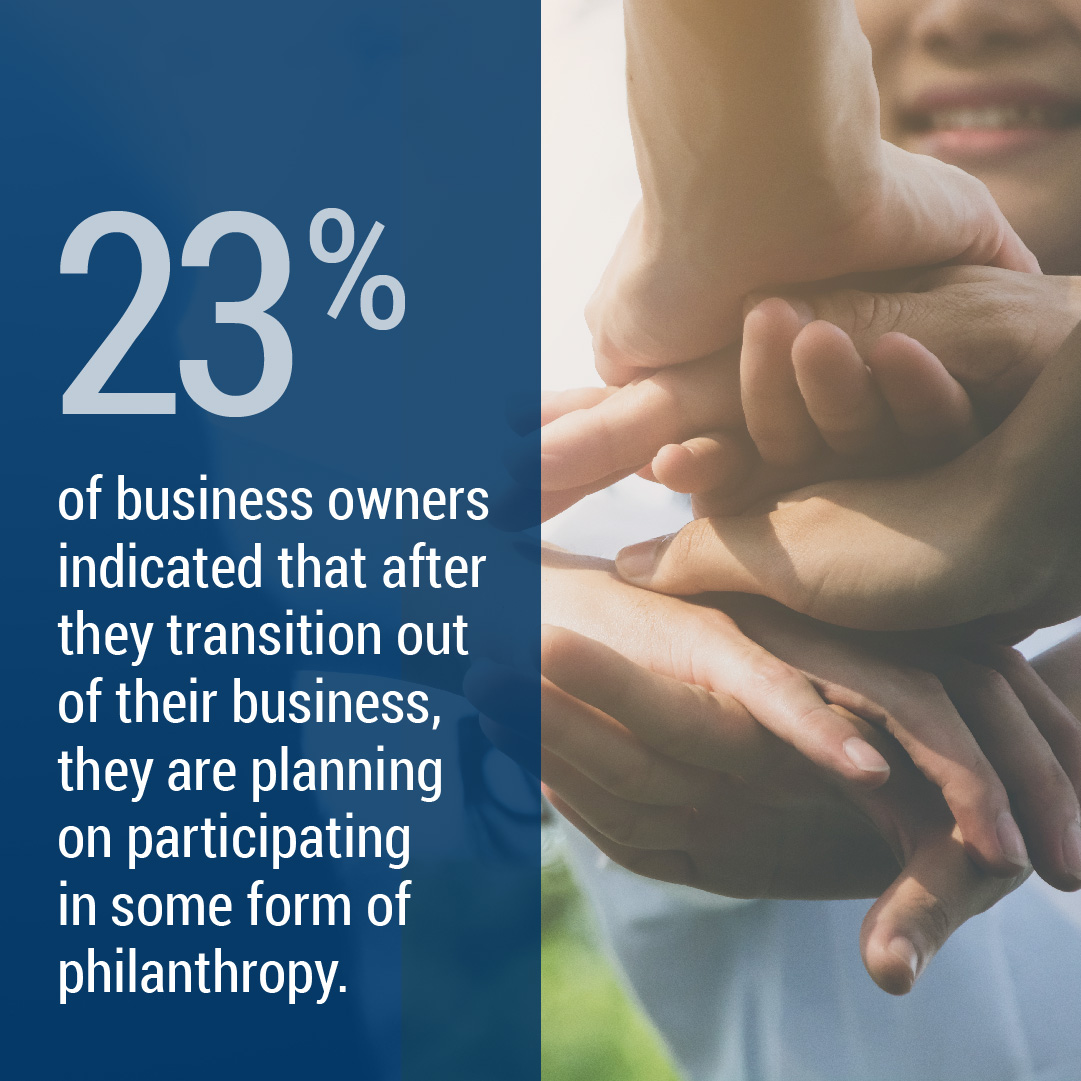
THE EXIT PLANNING BLOG
Keep up-to-date with exit planning, succession planning, industry trends, unique specialty insights, and useful content for professional advisors and business owners.
Share this
How to Incorporate Charitable Intent with Business Exit Planning
by Colleen Kowalski on September 3, 2021

September 5th is recognized as the International Day of Charity. According to our Nebraska 2019 State of Owner Readiness Report, 23% of business owners indicated that after they transition out of their business, they are planning on participating in some form of philanthropy. The question becomes: how do you as a business owner decide what organizations or causes to support? And even more importantly, how much do you plan on setting aside with charitable intent?
How To Start The Conversation About Charitable Intent
With the statistics highlighting that roughly one in five business owners plans on doing charitable work after exiting their business, professional advisors must begin charitable intent discussions well in advance of the owner’s transition event. According to Landon Mance, a registered representative with Lincoln Financial Advisors and co-founder of Backbone Planning Partners, “Sometimes clients don’t even realize they’re charitably inclined. You have to ask them what causes, outside of work, are important to them. And then ask good follow-up questions to identify organizations, groups, charities, or the like that they’re contributing their time or money to.”
As Joe Strazzeri, Co-Founder and Principal of Southern Carolina Institute and Partner of Strazzeri Mancini, LLP, teaches in our Certified Exit Planning Advisor program, 66% of owners are interested in learning about at least one topic that pertains to philanthropy, charitable trusts, socially responsible investing, or strategic giving plans. Charitable discussions with business owners can help ascertain some of the attitudes and values that may be preventing an exit strategy. But as an owner’s valued advisor, you can build trust through charitable giving conversations.
How to Determine Charitable Intent in a Family Business
Family businesses make up 90% of all businesses in the United States. According to Inc., “Since much conflict arises due to a disparity between family and business goals, planning is required to align these goals and formulate a strategy for reaching them. The ideal plan will allow the company to balance family and business needs to everyone’s advantage.”
In CEPA, we teach that charitable intent conversations benefit family businesses especially because it allows them to develop an emotional and functional bridge between wealth, purpose, and society. Before exiting your company, consider what causes are important to you and your family. How would you like to support them? Decide, as a family, on what causes to support financially or through volunteering time. That way, not only will your assets be passed down to the next generation, but your values as well.
In a 2016 study conducted by the EY Family Business Center of Excellence, “more than two-thirds of all respondents indicated that their wealth is to some extent dedicated to social impact investing. On average, family businesses globally invest 3.1% of their wealth in social impact.” This aligns with what Landon Mance sees with his clients. “We see our clients contributing either somewhere in the 5-10% range or more in the 1-3% range.”
What Can be Gifted?
When determining your charitable gifting strategy during your business exit, there are numerous assets that can be gifted. Landon says, “Gifting is such a powerful tool to take advantage of while you’re living! Gifting shares of a family business can be a wonderful strategy because you can take advantage of valuation discounts. There are many ways to gift assets. One of the most important things for a donor to decide is how much control they are willing to give up.”
Some popular assets that owners gift are:
- Cash
- Marketable securities (stocks, bonds, mutual funds, etc.)
- Illiquid assets (C-Corps, S-Corps, residential or commercial real estate, collectibles, etc.)
- Insurance policies (whole life, universal life, or variable life)
- Accounts that create income for a beneficiary (401K plan, IRA, SEP, profit-sharing plans)
Think About More than Just The “Tax Incentives” of Charitable Planning
Without a doubt, the tax incentives that come with supporting philanthropic efforts and charitable organizations are a strong pull for business owners. However, most business owners consider more than the tax benefits that come with being charitably inclined. Mance says, “If your objective with charitable contributions is to reduce your taxes, that is fine. But I’d encourage you to go deeper. The best way to do that is to roll your sleeves up and go volunteer at an organization you’re passionate about.
Once you see the work they do and the value received by the beneficiaries of their work, you may just change your tune. Hopefully, this will increase your dollars going to them! People think you can only make an impact if you have hundreds of thousands of dollars to donate and that is just simply not the case. Well-run charities will utilize every dollar they receive, and it does make a difference.”
Incorporate a charitable planning discussion early on in your exit planning process. This ensures that your personal passions and family values are well represented in your life after business.
Learn more about charitable planning in our Certified Exit Planning Advisor program.
Download the brochure to learn more about earning the CEPA credential.
Download CEPA BrochureShare this
- Blog (547)
- CEPA (429)
- exit planning (249)
- CEPA community (188)
- Business Owner (173)
- Exit Planning Summit (99)
- EPI Chapter Network (89)
- Value Acceleration Methodology (81)
- Exit Planning Partner Network (76)
- EPI Announcement (50)
- Content (48)
- Webinars (37)
- Excellence in Exit Planning Awards (34)
- Marketing (30)
- 2024 Exit Planning Summit (28)
- 5 Stages of Value Maturity (26)
- Books (24)
- EPI Academy (24)
- EPI Team (22)
- Exit Planning Teams (22)
- Leadership (21)
- 2023 Exit Planning Summit (20)
- family business (20)
- women in business (19)
- Intangible Capital (18)
- Exit Options (17)
- Black Friday (16)
- CPA (15)
- Walking to Destiny (15)
- Chapters (14)
- State of Owner Readiness (14)
- Chris Snider (12)
- National Accounts (12)
- Small business (12)
- charitable intent (12)
- personal planning (12)
- Financial Advisors (11)
- Season of Deals (9)
- 5 Ds (8)
- About us (8)
- Podcast (8)
- Scott Snider (8)
- Insiders Bash (7)
- Christmas (6)
- Exit Planning Content Library (6)
- Case Studies (5)
- Owner Roundtables (5)
- Three Legs of the Stool (5)
- Value Advisors (5)
- financial planning (5)
- Awards (4)
- Circle of Excellence (4)
- EPI Thought Leadership Council (4)
- Exit & Succession (4)
- Five Ds (4)
- executive training (4)
- Owners Forum (3)
- author (3)
- forbes (3)
- DriveValue (2)
- Exit Is Now Podcast (2)
- Peter Christman (2)
- Veteran (2)
- Whitepapers (2)
- Annual Exit (1)
- Business Owners Forum (1)
- SOOR (1)
- business consultants (1)






